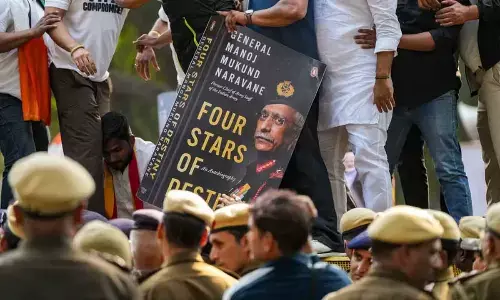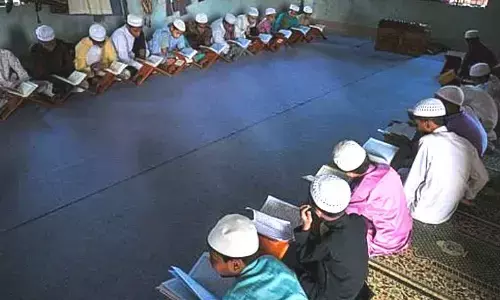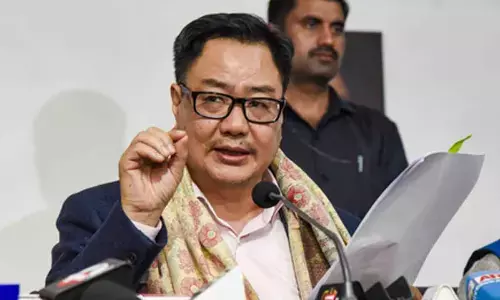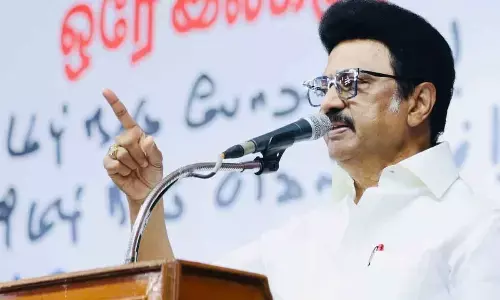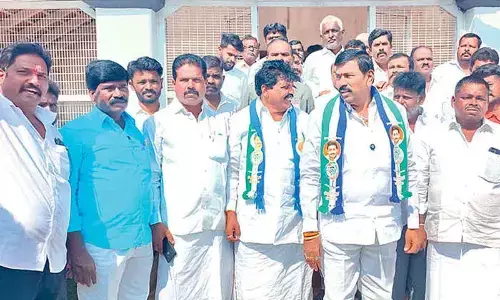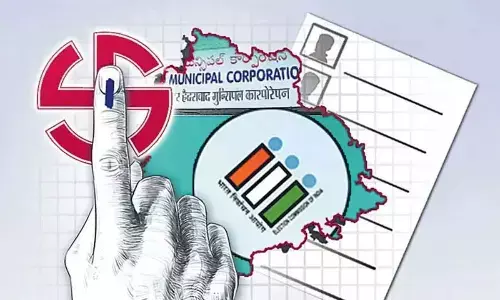I.N.D.I.A fails to rise to the occasion
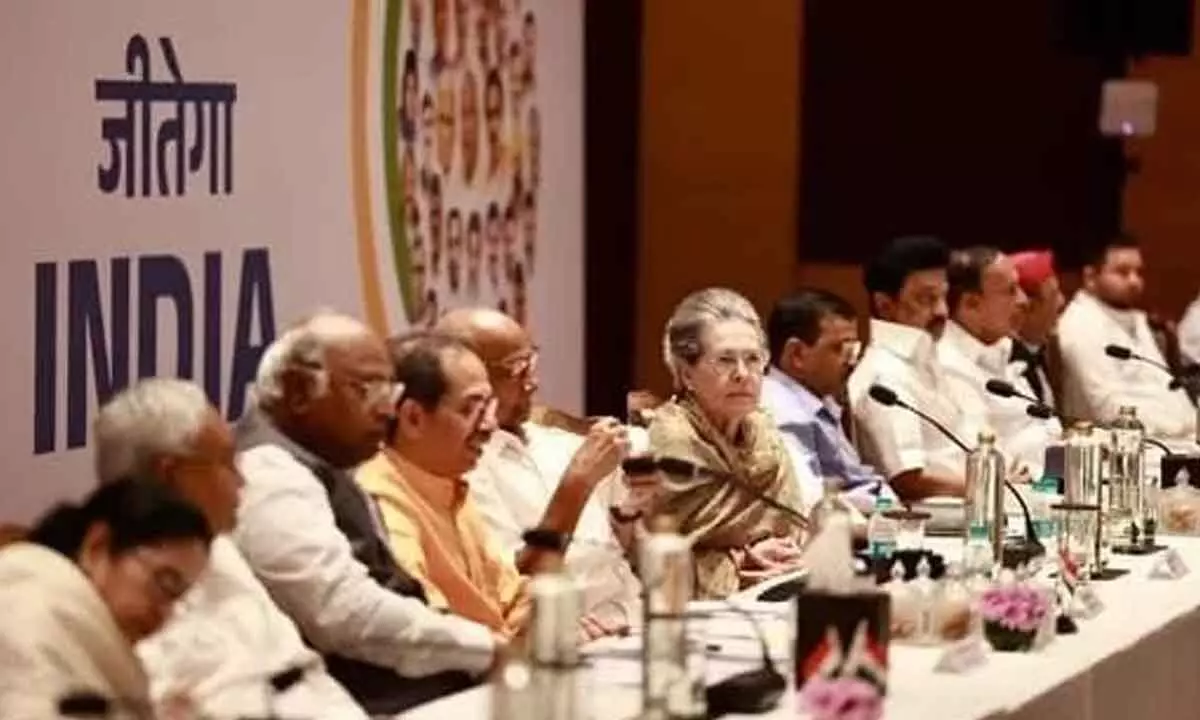
Displaying only diversity, not unity, the members of opposition bloc put themselves in an embarrassing situation before the nation. They could not even call a spade a spade when one of the constituents shows utter disregard for Sanatana Dharma which transcends religion and stands for lofty duties at individual and societal levels. In doing so, they seem to side with the disparaging comments of DMK against both Sanatana Dharma and Hinduism, vitiating minds and attempting to disturb peace and tranquillity in the society. The bloc I.N.D.I.A’s opposition to ‘Bharat’ also stems from the same refrain, and so is Rahul’s penchant for talking of political differences at international fora
India is known for unity in diversity. But the bloc I.N.D.I.A seems to be having only diversity and no unity. For any bloc to come to power, a perfect understanding and action plan is necessary to create confidence among people so that they can vote for them. On any issue, they should be speaking with clarity and the line they adopt should be same. But the bloc I.N.D.I.A so far has not displayed that kind of maturity. A mere conglomeration will not help them in any manner.
Let us take a simple example of the statements made by Udayanidhi Stalin, who is a minister in the DMK government in Tamil Nadu and is also the son of Chief Minister M K Stalin, on Santana Dharma. Of course, one cannot expect anything better from DMK on such issues because the party was formed on the basis of strong anti-caste and anti-religion principles.
In 1938, the Justice Party of which E V Ramaswamy Periyar, the founder of Dravidian movement, was a member and the Self-Respect Movement came together. In 1944, the new outfit was named Dravidar Kazhagam. DK was anti-Brahmin, anti-Congress, and anti-Aryan and launched a movement for an independent Dravida nation. However, for the nation part it did not get popular support.
Through his writings and speeches, Periyar propagated his core beliefs, which were fiercely critical of Hindu religious practices that marginalised some sections of society. Describing his mission, he said: “I am a reformer of the human society. I do not care about country, god, religion, language, or the state. I am only concerned about the welfare and growth of the human society.” Periyar wrote in his party paper Kudiarasu on 7 June 1931 that the non-Brahmins and the untouchable castes, the poor and the working classes, if they desired equality and socialism, needed to destroy Hinduism first. He was also critical of Hindu epics like the Ramayana.
Well, that might have worked well for the DMK party to thrive and survive in Tamil Nadu politics though the state has a large number of temples which are very popular and temple tourism is one of the important revenue-earners for the state, but at the national level, DMK is part of the bloc I.N.D.I.A which dreams to come to power and rule the country in 2024; such statements form important leaders of those parties sound preposterous.
The TN Chief Minister unfortunately displayed a narrow outlook by supporting his son and what added fuel to fire was the manner in which DMK MP A Raja who is a former Telecom Minister in UPA government and was accused of selling 2G spectrum licences at a very low cost, which resulted in a loss of 1,760 billion ($25 billion) in government revenue, compared Santana Dharma to HIV and Leprosy. He not only insulted those who believe in Santana Dharma but also those who are victims of HIV and Leprosy.
In fact, the comments on Sanatana Dharma by both Stalins and Raja have pushed the grand old party which is being guided by equally grand old leaders into an embarrassing situation, more so because they too did not know what exactly Santana Dharma was as they, perhaps, never read Hindu scriptures. They did not have the spine to call a spade a spade and say that they do not support any such statements which hurt the sentiments of the majority section of the country whom they will have to rule if they ever come back to power.
For the benefit of the modern youth and politicians – young and old – who think uttering the word Santana is a sin, let me tell them that the word ‘Sanatana’ has its roots in Sanskrit which can be translated into “eternal”, “ancient”, “venerable”, or “unshakeable”. The word ‘Sanatana’ was first used in the Bhagavad Gita, and refers to knowledge of the soul, which is eternal.”
According to ISKCON, Dharma is often translated as “duty,” “religion” or “religious duty.” The word itself comes from the Sanskrit root “dhri,” which means “to sustain.” Another related meaning is “that which is integral to something.” For example, the dharma of sugar is to be sweet and the dharma of fire to be hot. Therefore, a person’s dharma consists of duties that sustain him, according to his innate characteristics. Such characteristics are both material and spiritual, generating two corresponding types of dharma: (a) Sanatana dharma – duties which take into account the person’s spiritual (constitutional) identity as atman and are thus the same for everyone; (b) Varnashrama-dharma – duties performed according to one’s material (conditional) nature and specific to the individual at that particular time (see Varnashrama Dharma). According to the notion of Sanatana dharma, the eternal and intrinsic inclination of the living entity (atman) is to perform seva (service). Sanatana dharma, being transcendental, refers to universal and axiomatic laws that are beyond our temporary belief systems.
Key point, according to ISKCON, is Dharma means duties that sustain us according to our intrinsic nature and basic moral codes are called Sadharana dharma. They also give an interesting analogy. The same sun is called by different names in different countries but remains one no matter how widely we travel. Similarly, God is above such designations as “British” or “Indian,” “Christian” or “Hindu.” The soul also transcends such temporary labels. Real religion, which involves re-establishing and acting in one’s eternal relationship with God, is above worldly and sectarian designations. Another analogy they give is various universities teach the same subject. A related metaphor, which endorses the autonomy of the different religious traditions, compares religion to a science. Students may attend different universities – and the autonomy of each is to be respected – but the subjects are universal. For example, mathematical laws remain the same, whether in India or in Britain.
Similarly, one may accept a particular religious tradition, but the subject is the same. Many Hindus would, therefore, also include members of other religious traditions under the banner of Sanatana dharma, though they may have a natural preference for their own particular “school.” They further say that equality is the notion of Sanatana dharma as a basis for spiritual unity. Interfaith dialogue and inter-religious understanding denote the relationship between faith, truth and opinion.
Some groups are reluctant to call themselves Hindu, largely because of its misleading and sectarian connotations. Other groups are happy to use the term. “Dharma is sometimes translated as ‘religion’ but that is not exactly the meaning. Dharma actually means ‘that which one cannot give up’ and ‘that which is inseparable from oneself’. That eternal occupation is engagement in the transcendental loving service of the Lord,” according to A C Bhaktivedanta Swami.
This being the situation, it is funny that the even the senior most Congress leaders including the octogenarian Mallikarjun Kharge could not tell the country that it is time the bloc I.N.D.I.A partners keep their regional politics confined to the boundaries of their respective states and behave with a national outlook if they want to come to power. The Congress party claims they are secular and broadminded but still does not know the meaning of Sanatana Dharma nor do they like the usage of the word ‘Bharat.’
We have seen the comments of Rahul Gandhi who has developed a penchant for criticising India abroad. This attitude is unexplainable. There is a saying that one can explain things to a person who knows everything or to a person who is totally ignorant, but one cannot explain anything to a person who pretends to be knowing everything. The conglomeration of 28 parties resembles the last analogy.
In fact, I was expecting Rahul Gandhi to showcase his gyan on Sanatana Dharma in Brussels but, somehow, he spared us from it and focussed more on the President of Bharat and not inviting AICC president and Leader of Opposition in Rajya Sabha for G-20 dinner. Well, Rahul Gandhi should explain why his party Chief Ministers like Siddaramaiah, Ashok Gehlot and others who were invited as Chief Ministers, not as party leaders, were not attending the dinner. Is this the kind of unity in diversity the Congress believes?
Political differences within the country should not reflect at international forums if one is a true Indian or a real Bharatiya. Did not Ceylon change its name as Sri Lanka? What about Burma which changed its name as Myanmar? The bloc I.N.D.I.A has no objection. But calling India as Bharat which is very much there in Article 1 of the Constitution, is troubling them.
What equally leaves me aghast is that why some regional party leaders like K Chandrashekar Rao of Bharatiya Rashtra Samiti are silent. He is a leader who is well read and a strong believer in Sanatana Dharma and who put a temple like Yadadri on the map of world tourism and a man who performs yagnas for the well-being of the people of Telangana and one who wants Kisan Sarkar at national level. Why is he then silent? It’s time such leaders spread gyan to the majority of the leaders of bloc I.N.D.I.A. Bharat wants Bhagya Vidhatas who can take the country forward and not those who would like to eradicate Santana Dharma or show contempt for words such as ‘Bharat’ that the country had witnessed for centuries together under British rule.


